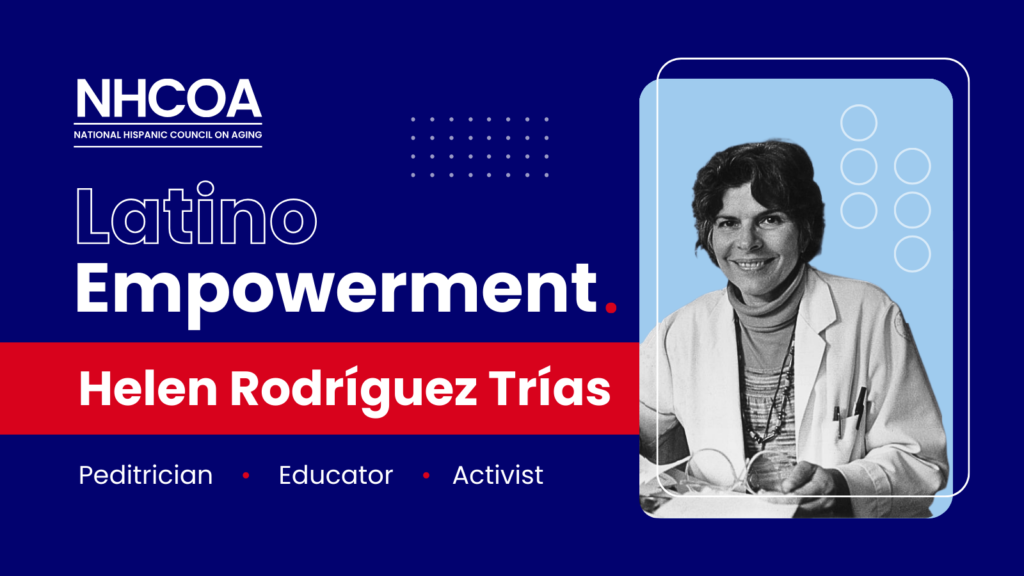
Pediatrician, educator and women’s rights activist, Helen Rodríguez Trías was born on July 7, 1929 and died on December 27, 2001 from complications of cancer. She was active in improving public health in Puerto Rico and New York. She was born in New York but spent her childhood in Puerto Rico. As a child, she experienced injustice due to her Latino heritage; for example, she saw her mother, a school teacher, fight against the enforcement of English as the only language by the U.S. military occupation in Puerto Rico.
At the age of ten, she returned to New York with her family, where she faced racism and discrimination. Because she was not a white American girl, she was moved to the class of mentally challenged students in elementary school, despite her high intelligence.
She studied medicine in Puerto Rico and received her degree in 1957. The main reason she chose this career is because it combined people and science, two of the things Rodríguez Trías had a great interest in. After obtaining her license, during her residency at the University Hospital of San Juan, she established the first center for the care of newborn babies in Puerto Rico. There, the mortality rate for newborns decreased 50% in three years.
She was part of the Puerto Rican nationalist movement and once led a campaign against the abuse of reproductive sterilization of women in Puerto Rico. In Puerto Rico, 30% of women of color or poor women of reproductive age were being sterilized without understanding the risks they faced and that these methods could be irreversible, such as tubal ligation or removal of the uterus. This was part of a strategy to develop technology in U.S. reproductive control, in which Puerto Rican women without the economic resources to bring babies into the world were being used as laboratory experiments.
During the 1950s and 1960s, Helen exposed many stories of women who experienced this injustice and established a list of reproductive rights for them, which eventually spread throughout Puerto Rico, and then to urban universities in the United States. She helped expand the range of public health services for women and children in low-income and minority populations in the United States, Central and South America, Africa, Asia and the Middle East.
She returned to New York in 1970 and was appointed head of the Department of Pediatrics at Lincoln Hospital in the Bronx, one of the places with the highest concentration of Puerto Ricans in the United States. Here she sensitized white physicians to the problems that Puerto Rican people faced, listened to their needs and made them visible. Furthermore, she was an associate professor at Albert Einstein College of Medicine, Yeshiva University, and also taught at Columbia and Fordham Universities.
She was also involved in the October 1970 abortion rights movement that began at Barnard College in New York. This movement believed that the only way to bring about change in the system was for more women to enter these professions and introduce a new, more humane perspective and a better doctor-patient relationship. This movement was mainly promoted by white women and, therefore, Rodríguez Trías was able to represent the most marginalized and precarious women—poor women and women of color—who had hardly had a voice until then.
In 1973, she was the first Hispanic president of the American Public Health Association (APHA), of which she had been a member since 1971. From 1996 to 1999, she was co-director of the Pacific Institute for Women’s Health, a non-profit group of researchers and advocates dedicated to improving women’s reproductive well-being.
She also chaired the New York Health Department’s AIDS Institute in the 1980s, where she specialized in helping women and children who had contracted HIV. In 2001, she received the Presidential Citizens Medal for her work on behalf of women, children, people with HIV and AIDS and the disadvantaged.
Today, the reproductive health system is much better because of the work of people like Helen Rodríguez Trías. Leaders like her understand that the social dimension of health is an aspect to be taken into account, in addition to the mental and physical, for social welfare and adequate public health policies for the population.
References:
https://mujeresconciencia.com/2022/09/01/helen-rodriguez-trias-medica-y-activista-por-los-derechos-a-la-salud/
https://campuspress.yale.edu/s130proyectocultural/helen-rodriguez-trias/
https://mujeresconciencia.com/2018/07/07/helen-rodriguez-trias-pediatra/
https://cfmedicine.nlm.nih.gov/physicians/biography_273.html

Recent Comments